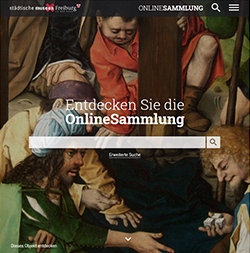Insights into the History of the Collection
Georg Ziegenbein
17.2.1871 – 3.1.1956
Georg Ziegenbein came from Altona-Bahrenfeld in Hamburg. He completed a commercial apprenticeship. Afterwards, he volunteered for military service in the Mounted Artillery Regiment No. 9 for a year and spent time in Mexico from 1891 to 1894. After his return from overseas, he was a factory proprietor in Freiburg from 1899 to 1930. From 1900 Ziegenbein was a partner and, from 1902, sole proprietor of the company MEZ Vater & Söhne (MEZ Father & Sons), which was later renamed Georg Ziegenbein Strickwarenfabrik (Georg Ziegenbein's Knitwear Factory). His marriage to Helena Mez, the daughter of the company owner, made it possible for him to join the company. Ziegenbein was also a member of the German Fleet Association and from 1910 to 1919, he was a member of the Freiburg Chamber of Commerce, where many other museum donors were also active. During the First World War he became lieutenant of the Landsturm local militia in 1918. Until 1938 he was the managing director of a company in Vienna that was liquidated during the Second World War. He tried to have the company classified as a victim of National Socialism and filed a corresponding lawsuit, but this was unsuccessful.
Ziegenbein Donation
Georg Ziegenbein was in contact with the museum for several years and made a donation in 1902. This comprised two boxes of objects from Mexico, which he had probably acquired during his time in Central America. However, the objects were damaged in transit and were reassembled in the museum by the employee responsible at the time. According to the list of the most generous donors up to 1905, Hugo Ficke valued the donations from Georg Ziegenbein at 350 marks. The present Ethnological Collection contains thirty-three Mexican objects from this source.



